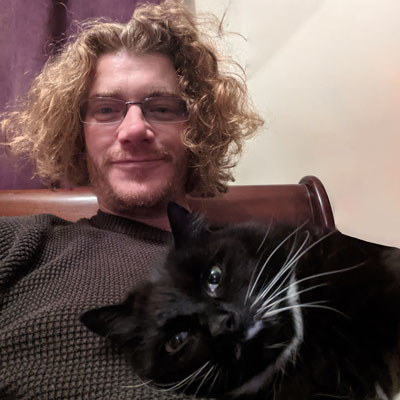How to discipline a puppy to create a trusting bond
Wondering how to discipline a puppy? We talk you through the best ways to respond to your little one’s challenging behaviors
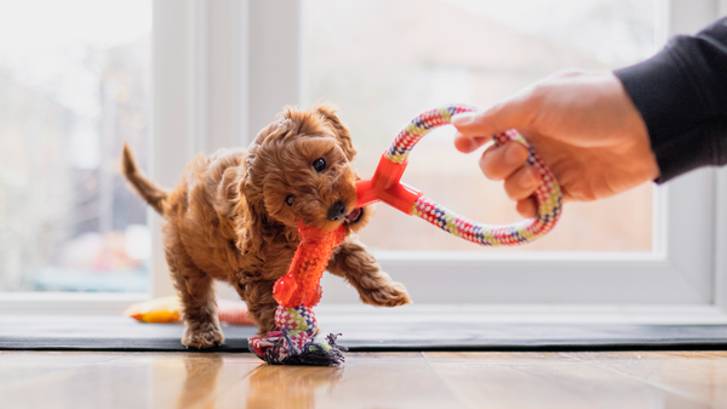
Learning how to discipline a puppy is no easy task. While you likely don’t want your new fur friend chewing on your clothing or furniture, or consistently barking and whining when you pop them in their crate, you may also be struggling to walk the fine line between teaching them what behavior is expected of them and punishing them.
If you’re feeling stuck with how to reinforce the behavior you want to see in your puppy, rest assured, you’re not alone. While shopping for the best puppy toys and food can certainly take plenty of time and research, what we often find most challenging as pet parents is teaching our puppies what’s expected of them in a way that’s both firm and fun.
It’s understandable to feel frustrated or angry if you come home to discover your puppy has chewed through your favorite pair of shoes, but it’s important to understand that verbal or physical discipline can make it very difficult for your dog to learn and can also destroy the bond the two of you share.
To help you approach disciplining your puppy in the right way, we spoke to Dr. Joanna Woodnutt to get her tips on what you can do if your puppy is engaging in undesirable behaviors, such as biting, chewing on the furniture, and jumping up. Here’s what she had to say…..
How do you effectively discipline a puppy?
The short answer on how to discipline a puppy is that you don't! Puppies are energetic and impulsive. They do things without thinking, and they aren't doing it to assert dominance or to defy you. They do it because it seems a fun thing to do. This is why puppies will not react in the desired way to discipline by punishments.
Verbal and physical discipline is simply not understood by dogs. Any shouting, smacks or time outs will not be associated with their bad actions, instead they will be associated with you – they will just think you are being mean to them for no apparent reason.
This can destroy your bond with your new canine friend and will cause your puppy not to trust you and even become aggressive in return. To effectively discipline your dog you need to take a step back and understand why they do the things they do.
Get the best advice, tips and top tech for your beloved Pets
Then use this understanding to reinforce better behaviors. From the very beginning you need to be their fun friend who rewards them when they behave the way you want them to, something that Woodnutt agrees with.
"It’s best not to discipline a puppy, but instead to use redirection and positive reinforcement of the correct behaviour to train them," she explains. "‘Discipline’ usually means shouting, hitting, or otherwise providing a negative feeling, but the problem is that this sort of negative training makes it very difficult for dogs to learn. Just as you would be unlikely to learn effectively if your schoolteacher was prone to yelling or hitting, dogs can’t concentrate and learn when they’re afraid of you.
It’s been proven that fear and adrenaline interfere with memory, meaning that your dog will be less able to learn when negative techniques are used. Instead, you should use redirection (distracting them and showing them what you want them to do instead) and positive reinforcement (praise and treats when they do the right thing) to help them learn."
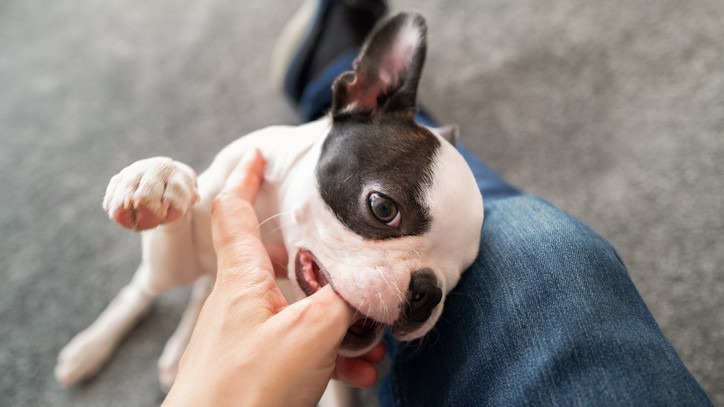
How to tackle common puppy behaviors
Biting
Puppies explore their new world with their mouths. They want to taste and bite everything to help them understand their surroundings. This means it's easier to provide them with something more entertaining to chew on than your arms or shoes.
"Puppies bite during play, and their puppy siblings would usually teach them not to do so," explains Woodnutt. "If your pup bites you while playing you should stop the game and ignore them for a minute or two. Some people also choose to squeal in pain to help the puppy understand what it is that stopped the game, but you do have to be careful with this – some dogs will find the squeal exciting and this may make them worse."
Distraction is the best way to get a puppy to stop biting. Sadly, you will need to supervise them pretty much 24/7 to ensure they don't turn their gnawing teeth to your precious belongings in the beginning, but it will be worth it in the long run.
Puppies will always choose to chew on something tasty rather than not, so providing them with lots of long lasting dog chews will satisfy their chewing cravings much more than your hands. Young dogs also chew because they are teething, so investing in the best teething toys for puppies is also advisable.
It's good to provide them with a space you can puppy-proof like a kitchen. However, do not shut them away on their own - dogs are social creatures, so it's better to keep them in a room which they can share with others. This also allows you to supervise their behavior and distract them with something better to chew on the moment they start gnawing where they shouldn't.
If they bite during play - which is more likely them just getting overexcited rather than them asserting dominance or looking to attack you - the best thing to do is just to stop playing with them and turn away from them. After a short pause start play again, remembering to stop each time biting occurs.
Note that rough play will pretty much always trigger biting, so is best avoided to stop them learning that rough-housing is desired behavior – it's cute when they are a puppy, but not so much fun with a full-grown dog! For more information, read our guide on how to play with a puppy.
Chewing furniture
"All dogs have an innate need to chew, and puppies especially so as their teeth are moving and growing," says Woodnutt. "Providing plenty of chew toys of the right type is key to stopping a puppy chewing things they shouldn’t. If you see your puppy chewing the furniture you can call them over to a more appropriate toy. Try to match the toy to what your dog likes to chew – dogs that chew wooden furniture might not like a rubber chew toy, and so on."
It's also important to remember that there's no point in taking a dog to an already chewed piece of furniture and scolding them in front of it. If they have chewed something when you've missed them doing it, you could consider spraying a dog-friendly deterrent, such as bitter apple spray (like this one on Amazon) to make those table legs less appealing to your furry friend.
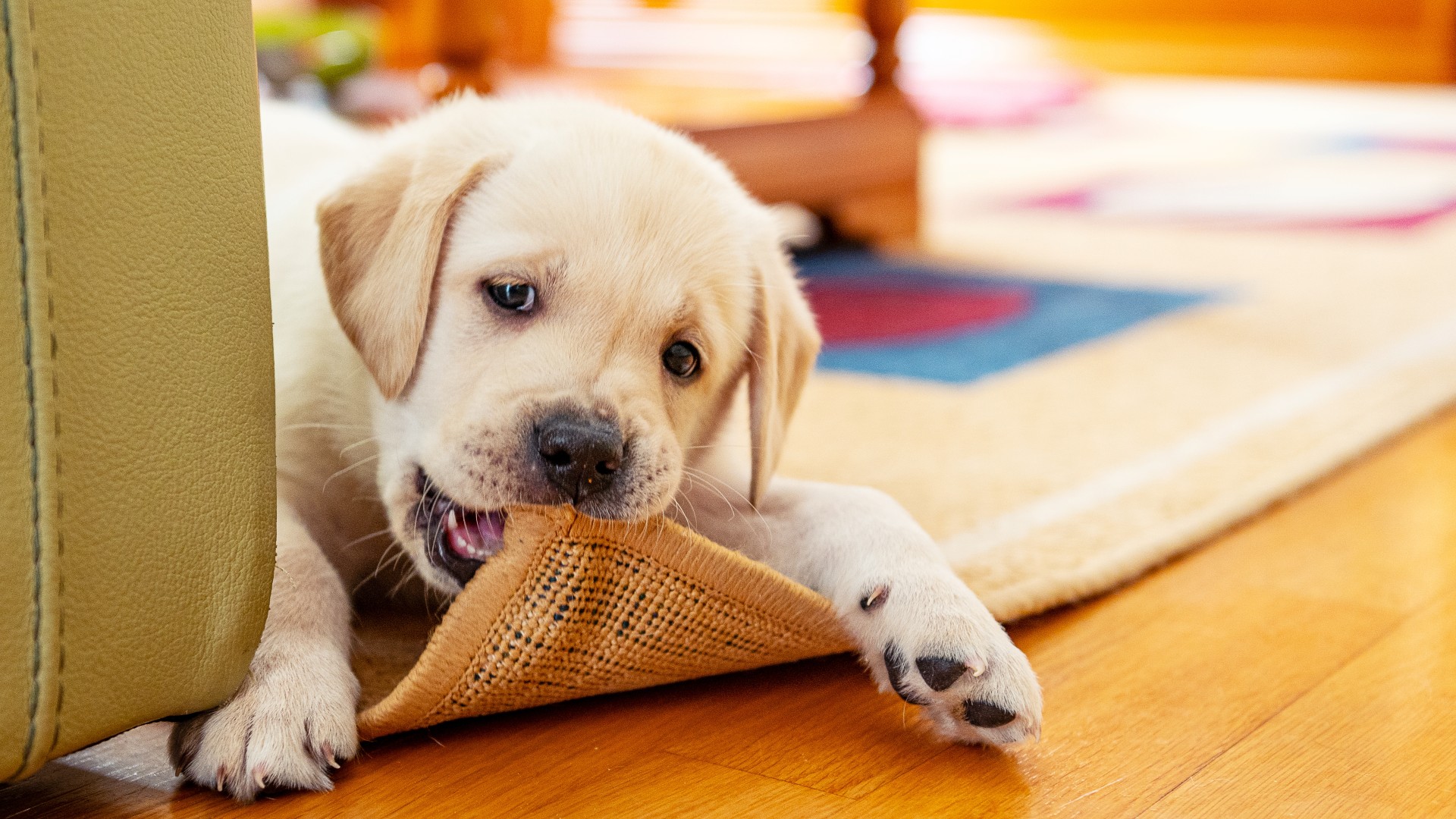
Jumping up
A puppy jumping up is a natural greeting behavior between a dog and its family. It is their way of getting the eye contact and the attention they crave. Again, shouting or violence is not the answer when looking to stop a puppy jumping up. Patience and positive reinforcement, although harder to do when they are seemingly being naughty, will provide you with better and longer lasting results.
"Encourage your puppy to stay on the floor by only petting and giving treats when all four paws are firmly on the ground," Woodnutt advises. "Ask visitors not to fuss your dog if they jump up – it can be very hard not to reward your dog for this bad behaviour. You can give them a small handful of treats to sprinkle on the floor as they come in the door – this should distract your dog long enough that your visitor can bend down to them and fuss them without your dog having jumped up at all."
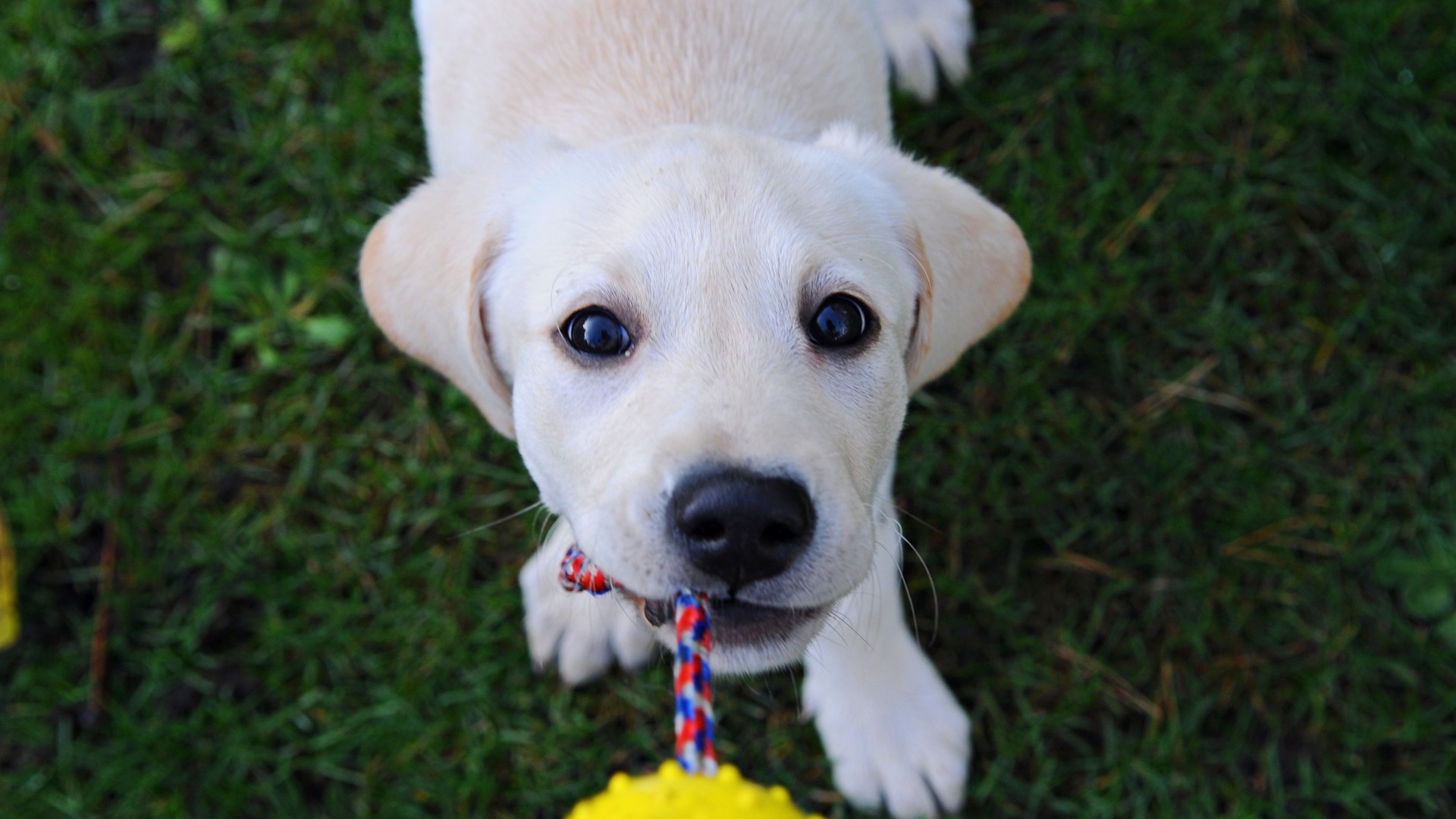
Puppy not listening
Puppies are excitable creatures, so if they aren't responding to you, it's important to remove all possible distractions first.
Exercise your dog before starting training. If they are full of pent-up energy, it's unlikely they are going to be ready to listen to you, they just want to bound around and play. It's also important to be calm when training your dog – frustration at them not doing what you want them to do will just confuse your puppy, and will mean they won't react to you.
Puppies are also much more likely to respond to non-verbal commands than verbal ones. They anticipate what you want them to do by reacting to actions you may not even be aware you are making.
If your puppy isn't listening to commands they have understood before, check you aren't doing something different that may be stopping the physical movements you usually make when asking them to do something: Are you carrying shopping? Are you restricting your movements by sitting? Are you not giving them your full attention? Take time, to engage fully with them when you want them to do something.
Check too that other members of the household are asking them to do things in the same way you are. If your pup is getting confusing signals, they may just not know which behavior is expected of them, so don't do anything. Consistency is very important, especially in the early days while they are still coming to terms with the new exciting world they have found themselves in.
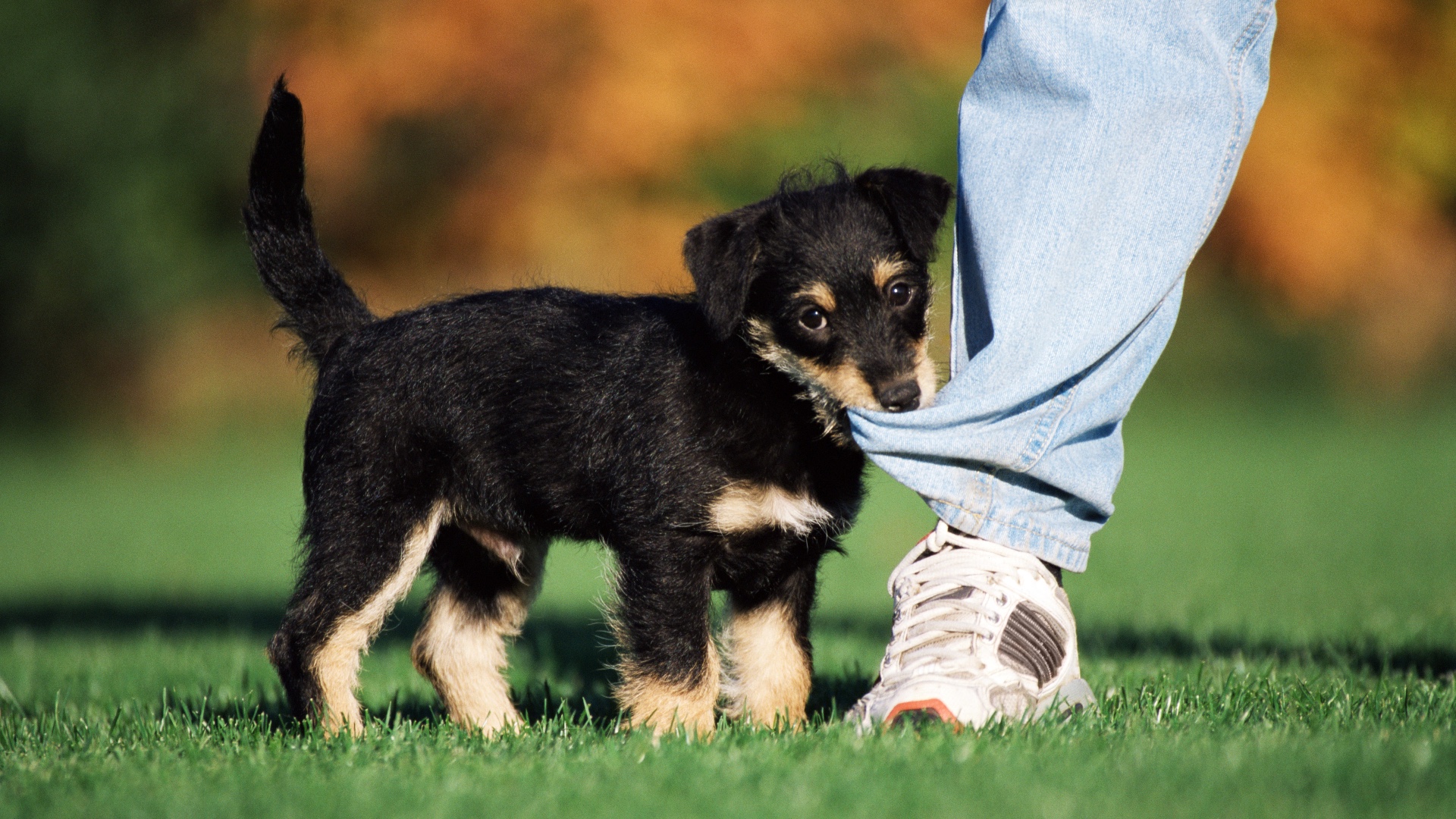
Puppy peeing in the house
By now, you won't be surprised to her that it's counterproductive to discipline a puppy when potty training. Sure, it's very tempting to yell at them when they relieve themselves in your house, especially if you catch them in the act. However, this action may well lead them to believe that it is peeing in front of you that is making you yell, not where they are doing it.
This can lead to them hiding in other rooms to do it, or to wait until you are out, and you've just made the issue worse. It can even lead to them not wanting to relieve themselves in front of you on walks.
Scolding them if you discover it later is equally bad, as the puppy will not associate the punishment with the mess on the floor – they just think you are shouting at them for no reason, and they will learn to fear you.
The best way to stop your puppy peeing in the house is to ensure they have lots of access to areas where they are allowed to pee – so regular visits outside, and rewards and attention being given when they relieve themselves in the right places is important. It can take over three weeks to learn they are expected to only in certain places, so be patient. Remember, human children take years to learn this, so cut your little furball a little slack!
It is on you to supervise them when they are indoors and if they display activity that suggests they need to go, to take them outside straight away. It's sensible to take them out after they wake up, after playing, and after eating and drinking, as these are often the times they most need to go. Very young puppies can't hold their bladder very long, so they may need to be given access to an outside area every half hour when they first join your household.
If accidents do happen, make sure you clean the area thoroughly to get the dog pee out of carpets and floors. You don't want your dog smelling where it has been before and to associate it with that action. Use soap or detergent to ensure there are no smell traces left – remember your furry friend's nose is a lot more sensitive than yours.
Regular urination inside can also be caused by medical issues, such as diabetes, urinary infections and kidney problems. If positive reinforcement isn't working after three weeks, a trip to the vets should be your next stop.
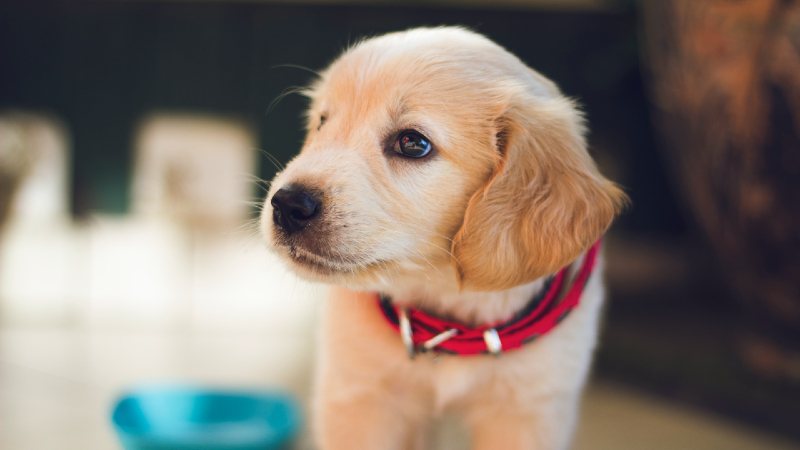
Whining
Whining is a very emotive noise and many pet owners can find it very distracting. However, that doesn't mean you should punish your puppy for whining, instead it's better to try to ignore them and then only when they stop, reward them with a treat or some attention.
"Try not to react when your dog whines – even a negative reaction or a ‘be quiet’ can be seen as rewarding reaction," Woodnutt explains. "Instead, reinforce when your dog is silent by giving treats or praise."
If the reason for the whining is obvious, like them wanting to go out for a toilet break, then respond to it to prevent them making a mess in the house, but try to be selective on how often you react to a whine. If your new furry friend learns that whining gets them food or attention, they may well carry this behavior on into adulthood.
If the whining is persistent and they seem to be in distress, this could show they are in pain or anxious about something. Again, verbal or physical discipline will not help you stop your dog whining, it's more likely that a trip to the vet is in order to check for any underlying conditions.
If you're looking for more great tips to help you in the first year of your fur friends life, be sure to check out our guide to how to stop your puppy crying in crate.

Dr Joanna Woodnutt graduated as a veterinarian from the University of Nottingham in the United Kingdom in 2016 and went on to practice companion animal medicine in the Midlands. She quickly developed a love of consulting and helping clients with medical problems such as dermatology, behavior, and nutrition. Dr Woodnutt now lives in the Channel Islands with her husband Ian, their daughter, and their terrier Pixie.
Jamie Middleton is a freelance editor and writer who has been editing and creating content for magazines and websites for over 20 years. As well as writing about the pets he loves, he has helped create websites about tech and innovation like TechRadar.com, Innovate UK and TechSPARK, written programmes for music festivals, books on inventions and architecture, TV listings magazines, and edited publications about cars such as Lexus, Toyota and Jaguar. In his spare time he writes fiction books and poetry - or at least he does when he is permitted to by his cat Pirate, who enjoys the warmth of laptops too much to allow being creative to get in the way.
